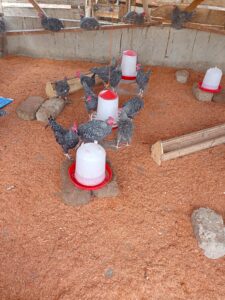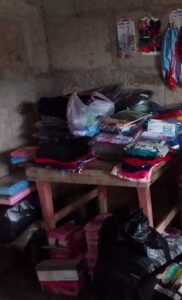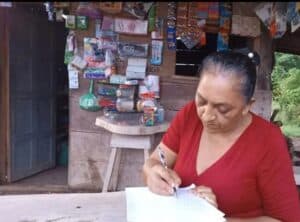
Self-Help Works with Ag Leaders to Explore Certified QPM Seed Production on Ometepe Island

Farmers on Ometepe Island.
By promoting Quality Protein Maize (QPM), Self-Help International’s agricultural program in Nicaragua strives to reduce hunger and malnutrition among rural Nicaraguan communities and improve the incomes of small farmers who produce corn for commercialization. QPM is a non-genetically modified corn that produces higher yields than traditional creole corn grown in Nicaragua and has double the amount of digestible protein as traditional corn.
Many subsistence farm families cannot afford to purchase protein-rich foods such as meat, eggs, or dairy products. QPM allows families to grow an affordable source of protein, which is critical to childhood brain development. Growing QPM also enables struggling farm families to feed themselves and to sell surplus corn for supplemental income.
Self-Help plants what is called “basic” seed at its Quinta Lidia headquarters and its Ochomogo agricultural plot. The planted basic seed yields “registered” seed, which is formally approved (as registered) by the Nicaraguan government. Self-Help then sells the registered seed to a core group of 10-15 farmers in the San Carlos and Ochomogo areas so they can produce Certified Seed. Self-Help loans money to these farmers for fertilizer and pesticides; the cost of the treatment; certification; and storage of the seed performed by the government. The farmers pay back these loans and provide all labor and land for seed production. They own the certified seed they produce and receive the funds from selling it. Self-Help oversees the process of cleaning, treating, testing, certifying and storing the certified seed.
Once the certified seed is ready for market, it is then sold to the public as “seed corn” in Self-Help labeled bags. Private crop input businesses (agroservicios) order the certified seed from Self-Help’s seed producing partners who – with Self-Help administrative support – transport it and sell it to individual farmers who produce commercial QPM corn. Commercial QPM corn still has elevated protein levels and produces substantially more volume of corn per land unit than traditional varieties. The commercial farmers consume the QPM corn at home and sell the excess in local open markets.
Since 2018, Self-Help has worked to expand the regions served by QPM corn. This expansion has featured Ometepe Island, a large volcanic island situated in the middle of Lake Nicaragua. This island is inhabited by approximately 30,000 Nicaraguans, who can benefit from increased protein and yields from QPM corn. Since 2018, Self-Help has supported the sale of this certified seed corn on Ometepe Island at the Agroservicios de Rivas and Isla de Ometepe and by way of partner cooperative BIOMETEPE.
In February 2021, Self-Help Nicaragua Country Director Jorge Campos, provided training to four potential seed producers and five technicians at the BIOMETEPE Cooperative on Ometepe Island. These farmers have extensive experience in the commercial production of QPM corn, and the technicians are very adept at providing technical support and follow-up.
Jorge trained the group on methods of seed selection, as well as on the technical aspects and agronomic management of corn, fertilization, pollination and nutrition plans. Jorge reports that this group has much experience in agroecology and the use of organic products, as agriculture on Ometepe Island must be especially environmentally friendly due to it being a protected and fragile ecology. The trainees later planted demonstration plots; and in June 2021, Jorge held a second training for the same group, who learned from and assessed the impressive work of their demonstration plots.
“Seeing their performance, we [at Self-Help] asked [the farmers] if they were willing to form a small group of Certified Seed Producers and the response was positive. That is why we are proposing a first training in the seed production and trade law, so that they have this knowledge and follow the certification process, the requirements for the production, processing, packaging and storage of seeds, and their commercialization,” said Jorge.
It is exciting that Self-Help is expanding to a new group of seed producers on Ometepe Island. In 2021, six producers in the San Carlos region intended on working with Self-Help production, though that number reduced to four. Now, Self-Help can confidently progress with a new group of seed producing leaders, all of whom have irrigation and planting areas free of contamination by pollen from other maize. Jorge acknowledges that there is a “drawback [in] transferring the seed to the plant in Managua; however, the Self-Help team will work with them to evaluate production and marketing costs.”
Jorge coordinates closely with the Nicaraguan government to provide this training and will supply support from Self-Help with registered seed; financing for the production of certified seed; advice, training, technical monitoring and coordination with the technicians of the BIOMETEPE Cooperative in each of the phases and processes; administrative assistance for the certification and sale of certified seed; assistance and advice in the processes of Industrial Conditioning and Cold Room Storage; and training on the costs of productions, so that producers can make decisions about the market and commercialization.
We are excited to see how this new group of agricultural leaders helps support Ometepe Islanders in accessing improved crops and increased protein!

 Previous Post
Previous Post Next Post
Next Post


